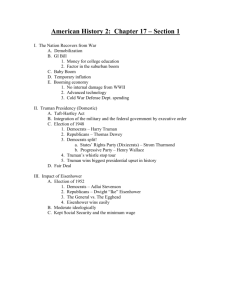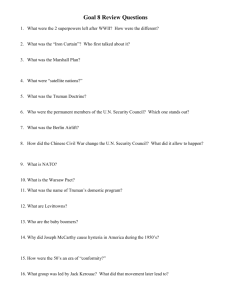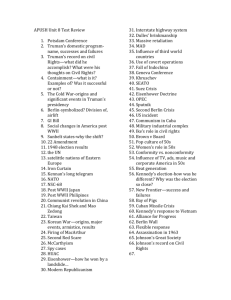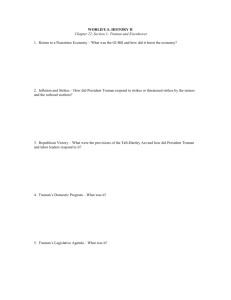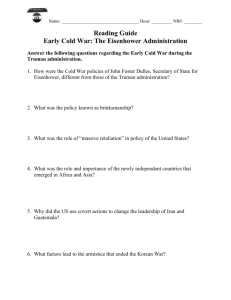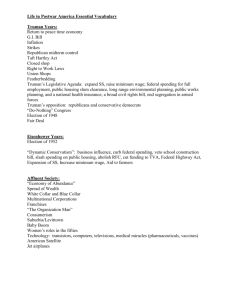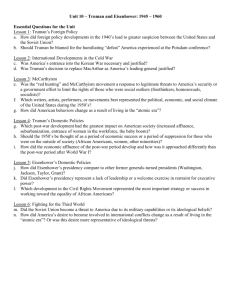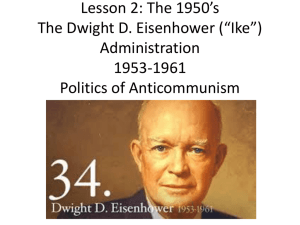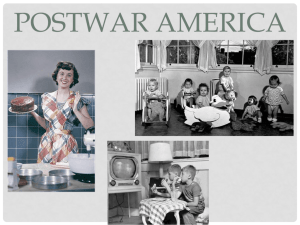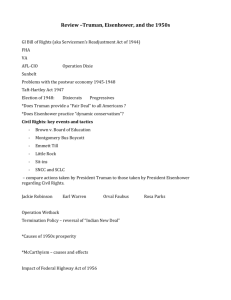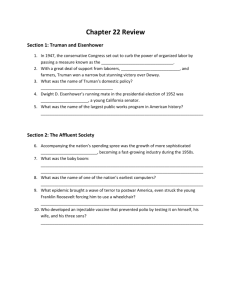Life in the 1950s
advertisement
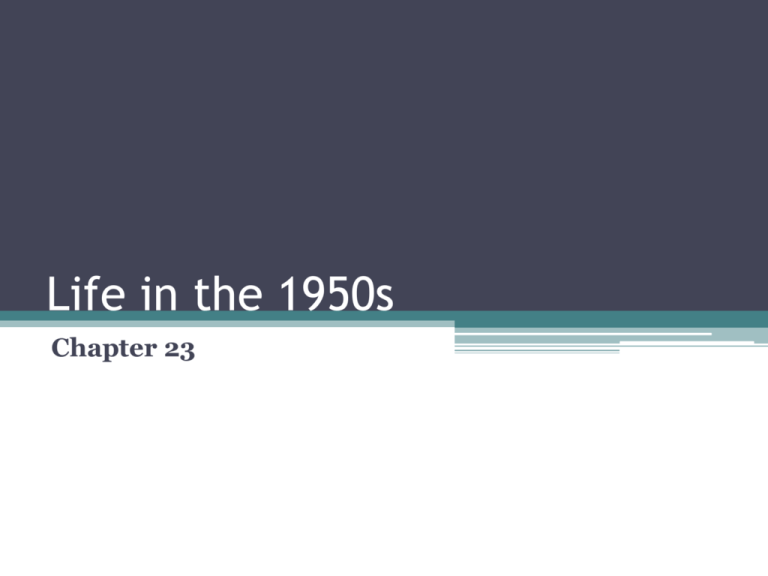
Life in the 1950s Chapter 23 Peacetime Economics- 23.1 Domestic Policies: Truman & Eisenhower After WWII, Americans feared the US would sink into the Depression again. • *The GI Bill (Servicemen’s Readjustment Act) • Gave money to veterans to start businesses, buy homes & go to college • US government poured $38.5 Billion into higher education for Military veterans. • Taft-Hartley Act (1947) ▫ Banned closed shop ▫ Allowed states to pass right to work laws ▫ Prohibited featherbedding ▫ Unions can’t use money to support political campaigns Truman & Civil Rights • 1948- Truman asked Congress: 1. Pass a Civil Rights Bill to do the following: • Protect African-American’s right to vote • Abolish poll taxes • Make lynching a federal crime ** His Civil Rights agenda was blocked by Republicans & Southern Democrats. ** Truman did: 1. Desegregate (integrate) the US military (1948) 2. Bar discrimination in federal government hiring. • Dixiecrats (a third party) ▫ Southern Democrats who split with Democrat Party over Civil Rights. ▫ Strom Thurmond-nominee • Progressive Party ▫ Democrats split because anti-Soviet & poor domestic policy ▫ Henry Wallace • Republican ▫ George Dewey • Democrat ▫ Harry Truman ▫ Blamed the “Do-Nothing Congress” Presidential Election of 1948 *The Fair Deal • Minimum wage raised • Increased social security benefits • National Housing Act of 1949 ▫ Construction of low income housing • Wanted but didn’t get: ▫ Civil Rights legislation ▫ Education federal aid ▫ National health insurance “Every segment of our population and every individual has a right to expect from . . . Government a fair deal.” The 1952 Election • Republicans nominated Dwight D. Eisenhower & Richard Nixon- “I like Ike” “It’s Time for a Change!” • Democrats nominated Adlai Stevenson 1952 Election Campaign • “Checkers Controversy”- Nixon addressed charges that he had accepted campaign contributions from wealthy donors. • Eisenhower & Nixon win in a landslide ** 1956- Eisenhower & Nixon won a second term!! Dynamic Conservatism • Eisenhower’s plan to balance economic conservatism with activism to benefit the country • *Federal Highway Act ▫ Largest public works project ever ▫ $25 Billion to construct 40,000 miles of highway. • Cut government spending • Limited government involvement The Affluent Society 1950’s a decade of prosperity 1. 1940-1955: family income tripled 2. 1940-1960:Home ownership 41% to 61% 3. Number of white collar jobs outpaced blue collar jobs. • “The Affluent Society”: Book written by John Kenneth Galbraith • An economy of abundance A. Multinational Corporations ▫ Offices & factories in other countries • Franchises & Chain stores “Communism doesn’t work because people like to own stuff.” – Frank Zappa What icon urged women to get out during WWII and work? 1. Superwoman 2. Carrie Chapman Catt 3. Alice Paul 4. Rosie the Riveter Conformity • New Consumerism ▫ Desire of people to conform to other people’s desires • Suburbia – **Levittown, NY ▫ 1st large suburbs; mass produced homes (Bill Levitt) • *The Baby Boom ▫ 1945 – 1961 – over 65 million babies were born Factors that led to the Baby Boom 1. Young couples delayed marriage until after WWII ended. 2. GI Bill encouraged home purchases 3. Advertising glorified parenthood Roles of Women in the 1950’s • Still looked upon as “homemaker” • Number of women working outside the home increased • TV glorified traditional “homemaker role” (Lucy, Father Knows Best”, Leave It to Beaver”) • Jonas Salk ▫ Developed injectable vaccine for polio • Transistor ▫ Made small radios & calculators possible • ENIAC – Electrical Numerical Integrator & Computer ▫ First computer used for the Army • UNIVAC – Universal Automatic Computer ▫ First computer for businesses • First American jet flight from NY to Los Angeles Albert Sabin: Oral Polio Vaccine. Pop Culture • Television • 1946- 8,000 TV sets in US • 1957- 80% owned TV’s • * America’s new favorite Pastime. ▫ News ▫ Advertising ▫ Ozzie & Harriet ▫ The Lone Ranger ▫ Dragnet Gameshows: $64,000 Question Twenty One- cheating scandal (Charles Van Doren) Movies lost popularity • Cinemascope, 3-D ▫ Became popular for its wide screens • Rock N’ Roll ▫ Distinctive music of the youth ▫ Roots in African American Rhythm & Blues • Elvis Presley – King of Rock N’Roll • African Americans found acceptance in Rock N’ Roll where they didn’t find it on TV or the movies ▫ ▫ ▫ ▫ Chuck Berry Ray Charles Little Richard The Drifters The Beat Movement • • • • • • The Beats-group of mostly white POETS Called themselves “the Beats” Criticized conformity Jack Kerouac Allen Ginsburg Generation Gap ▫ Created as young people united in music against their parents ▫ Juvenile Delinquency: 1948- 1953 juvenile crime increased 45% ; car theft popular crime among middle class whites youths The Other Americans • Written by Michael Harrington • Exposed poverty in America Appalachian region – poorest region • 1950’s young people left behind elderly & young children • Urban Renewal Programs ▫ Tried to eliminate poverty by tearing down slums & erecting new buildings • US gov’t evicted residents when they started to earn money= encouraged poverty Race in the 1950s • African Americans • Whites fled cities “white flight” ▫ Blacks left in deteriorating inner cities as suburbs grew ▫ NAACP – fought unsuccessfully for greater economic opportunity • Hispanics ▫ Brought over by Bracero program faced harsh working conditions Native Americans Policy 1950’s • The Termination Policy ▫ Federal government withdrew all official recognition of Native American groups ▫ Helped Native Americans move off reservations– land developers gained the land & got rich. ▫ Attempted to assimilate them into society as white citizens– Failed ▫ Helped deepen Native American poverty--
